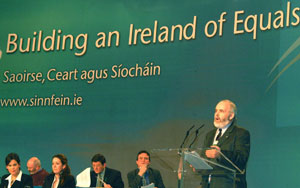14 December 2006 Edition
Interview - Francie Molloy MLA, Six County Assembly Deputy Speaker

Programme for Government must move on – Molloy
Sinn Féin MLA Francie Molloy is a joint Deputy Speaker of the Six County Assembly. In that role he also alternately chairs the Programme for Government Committee with the DUP’s Jim Wells. Here he speaks to ARAN FOLEY about the work of the committee, his own role and how he sees things progressing in the time ahead.
Despite the continued failure to achieve tangible progress towards the establishment of an Executive in the Six Counties, Francie Molloy has positive things to say about the work of the Assembly’s Programme for Government Committee.
“First there was the Preparation for Government Committee and now we are into the Programme for Government Committee. This has involved all of the parties”, Francie Molloy explains. He says that all the political parties are talking in a constructive and businesslike manner and that he would describe the engagements as positive.
“I think that barriers have definitely been broken down and frictions lessened and I have found the experience of chairing those meetings as extremely positive before we hopefully get into the situation of the Executive.
“There has been a very amicable arrangement between the parties about working through the structures and the chair. The image that is created all the time in certain quarters that there is this constant hostility is a false one”, he said.
There has been businesslike discussions about most of the major issues. The main problem was that the DUP refuses to see this as a process of preparation for government – an Executive in waiting. As a result, no big decisions have been made and no substantive programme for government has been established.
“The core problem here is the DUP’s refusal to see this as a preparatory committee designed to bring about a working executive. There are also issues around the timescale for the transfer of powers”, Molly says.
“There had been issues around the role of Ministers in the Executive. Both ourselves and the SDLP have been arguing that Ministers should keep and exercise their powers within the portfolio of each ministry while the Unionists have adopted the position that all ministers’ decisions should be referred back to the Executive.”
Some progress is being made however. Molly cited the area of cross-border co-operation, a surprising area of agreement. Both the Preparation for Government Committee and the Programme for Government Committee have had attached to them economic subcommittees. This is an area in which the Unionists seem particularly willing to work, especially in the area of the harmonisation of taxes but also in other areas.
“The issue of cross border bodies and their role and implementation not just North and South but also east and west had been accepted by all of the parties”, Molloy said.
“Over all I am optimistic that we can make some progress here if the political will is there. I mean we have now had upwards of 40 meetings both at Programme for Government level and at sub committee level.”
There are now six sub committees in existence, and under the d’Hondt system Sinn Féin is chairing two of them with the DUP chairing two and the remaining two going to the Ulster Unionists and the SDLP. MLAs Sue Ramsey and Tom O’Reilly are the Sinn Féin chairs of the Peace Dividend and Education Committees.
“These sub committees are dealing with all of the issues in a businesslike fashion, so yes, I do I feel optimism for the future”, Molloy says.
Asked had he detected any shift or change in attitude within the various parties, Molloy said that major change was in the way in which people felt more comfortable with each other and were not rigid as was the case the start of the process. As regards the substantive political issues he did not think it was right for him to comment given that his role is to facilitate dialogue and move it on.
“I think what has emerged is the acceptance of both Sinn Féin and the DUP as major players in all of this. I think with both myself and Jim Wells of the DUP as joint Deputy Speakers it shows the kind of progress that has been made. With myself taking the chair a number of weeks ago, there was no animosity or haggling and there seemed to be a full acceptance and respect for my position.
“You have to remember that when the Good Friday Agreement was signed neither the Ulster Unionist Party or ourselves had sat round a table together, so in that light, what I have outlined has to be seen as progress”, he says.
“I’d just like to say that the prospect of impending elections doesn’t really help matters. I think it is an impediment as everyone is looking over their shoulder. Elections by their nature generate friction. This is going to make coming to an accommodation all the harder and I really wish we weren’t engaged in these discussions with the spectre of an election hanging in the background. That said however I am confident that agreement can be reached. The status quo cannot remain. We must move on.”


